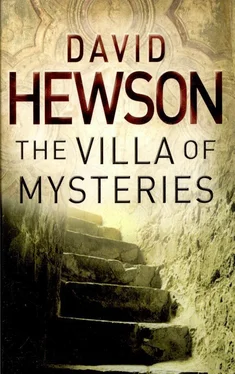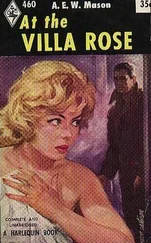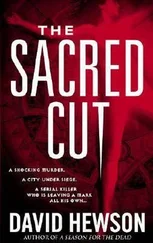The main wall opposite the entrance was occupied by a single work. The young woman was entering the presence of the god. Black slaves scourged her with whips. Satyrs played lutes in the background. There was terror on the initiate’s face. The god leered hungrily at her from his throne.
Costa turned to face the left wall. Here were more rituals: scourging, drinking, dancing, coupling. The four frames depicted an orgy but one that sat at the edge of sanity, like something from the imagination of a Roman Hieronymus Bosch. In the corners of the images there were revellers who were unconscious or vomiting. A pregnant mother suckled a child on one breast and a goat on the other. Women lay on their backs embracing horses and lions. Two girls were engaged in a bloody fight, rolling on the floor, scratching at each other’s eyes.
And in the last image an execution: one woman walked on, blind-folded, towards the god. The second was killed, her throat cut from behind by a grinning satyr who pressed his groin against her buttocks.
He turned to face the final frame, the counterpart to the first, set on the other side of the door. The god still sat on his throne but now he wore a mask, the obscene screaming mask that was the source of the tattoo he’d seen on both the dead Eleanor Jamieson and the living Suzi Julius. They were poor imitations. In the god’s face lay a blind, hungry fury that couldn’t be reduced to a scrawl on flesh.
The initiate was naked, half standing over him, face forward, as he savaged her from behind, his hand reaching round to grip her left breast hard between his fingers. Her face was partially covered with a veil. Her mouth was a wide-open screaming rictus of agony. The shape of his massive erection was visible beneath her open legs. Satyrs and hangers-on watched avidly, with wild eyes and open, hungry mouths.
Was this the ordeal Wallis’s stepdaughter had refused? Costa wondered. Perhaps in a room very much like this? And if she hadn’t, where would she be now? Anywhere, he realized. If Teresa was right, this villa was just an outpost. Somewhere in Rome there stood the Villa of Mysteries, the heart of the cult, a hidden temple, just like this one, buried beneath the earth.
It didn’t add up. One man, surely, would not go to these strange lengths. Randolph Kirk couldn’t have been the figure racing a bike across the Campo with Suzi Julius happy on the back. That was someone young, someone she knew.
Costa tried to think practical thoughts. This wasn’t an active dig. There was no sign of recent excavation. Yet people did come here regularly. He could see the odd cigarette butt and a few sweet wrappers. The university maintained the site. They would use it for study, surely.
He walked around the corners, using the torch to illuminate the darker parts.
Something bright lurked close to the image of the god and the screaming initiate. He took a plastic envelope out of his pocket, bent down and picked it up. It was an elastic hair-band, bright red, green and yellow, Rastafarian colours, the kind a young girl would use. He searched the rest of the room as best he could. There was nothing else of obvious interest.
Then he walked back up the stairs, back to the portable office. It was getting late now. Falcone looked tired, gloomy. D’Amato stood silent by his side.
“The scene-of-crime people can take a look at the place once they’re done here,” he said after listening to Costa’s ideas. “There’s probably nothing left from sixteen years ago, Nic, if that’s what you’re thinking. Besides, Lupo already said she was probably killed somewhere in the city.”
“I know,” he answered and held up the hair-band. “But this isn’t sixteen years old.”
Rachele D’Amato peered at the plastic bag. “It’s the kind of thing a child would wear,” she said. “Did they let children in there on visits?”
He thought of the pictures on the walls. “I can’t imagine they’d allow that.”
Falcone raised a grey eyebrow. “You think so? These are liberated days. Look, it’s late. If you think there’s something to chase here, go and see the mother. On your own. We’re a little short of men. If she recognizes it, try the lab. There must be millions like it. We need to know for sure. Then get some rest. We’re all going to be working overtime tomorrow.”
“You can say that again,” D’Amato whispered.
Costa saw them exchange a glance. He wondered if something was going on between them and whether that could cloud the man’s normally excellent judgement.
Then Falcone took him to one side, peered inquisitively into his face. “How are you doing? You look dog-tired. You been drinking recently?”
“No,” Costa snapped. “Are you my boss or my keeper?”
“A little of both. For now anyway.”
Falcone’s phone rang. He listened then said, “Wait for me.”
Costa hesitated, wanting to know the news.
“We’ll follow you part of the way,” Falcone said. “That was the crew at Fiumicino. They’re about to bring up the body. It seems Crazy Teresa can’t wait to get her hands on it.”
“Can you blame her?” D’Amato wondered.
“Damned right I can,” Falcone murmured, walking away so quickly they had to struggle to keep up.
THE RAIN HAD STOPPED. The heart of Rome was growing silent. A generous moon now stared down at its own hard reflection in the black shiny waters of the Tiber. The day’s warmth had fled, a reminder that winter was relinquishing its grip with a slowly dying reluctance.
Adele Neri lay alone in the bedroom. Her husband was still up, talking long and hard to the bleak, grey men he’d invited into their lives. Their voices crept beneath the closed door, intruding into her most private thoughts. Mickey was nowhere to be seen. Nor had he called. It was unusual, but not unexpected. He’d been crazier than normal recently. Some of it was due to the dope. Some of it was down to the deals on the side, and his terror that his father would find out about them. But most of it came from this sudden and fierce fixation for his stepmother, one she had no intention of discouraging. She liked the way he thought of her and the things she could do to him drove Mickey wild. Adele had some power over Emilio, but it was muted, fixed by boundaries, and always had been. Now it was waning too. Emilio was feeling his age, realizing that change would soon be inevitable.
Mickey was different. He’d do just about anything she asked. Anything. And he was young. He didn’t thrash away for a couple of minutes then roll over and go to sleep, grunting, snoring. He gave her something back. Although, when she thought about it, Adele Neri realised those gifts no longer contained the attraction for her they once had. The physical world had limitations. With age came a realization that there were more intangible goals in life: power, control, security. The ability to shape one’s own destiny.
Mickey wasn’t the only one she held in thrall like this either. When she thought about it, she was amazed she’d got away with her secret lovers for so long. She’d been careful, discreet, and sure to choose those who knew better than to boast. All the same Emilio Neri was a curious and vengeful man. There was a look in his eye just now that she didn’t like. He’d find out one day, and then she could only guess at what he’d do. There was, she thought, an inevitability to a life like hers: a period of infatuation, a time of spent satisfaction, then the final leg of the journey, ennui , sloth, disaster. Unless you planned. Unless you moved when the moment came. Emilio was getting slow and stupid. It was time, she thought, to think of the succession, before the hourglass ran dry and the empire crumbled to dust.
NIC COSTA PARKED THE CAR outside the looming bulk of the old Roman theatre, walked to the apartment and pressed the doorbell. He was still fighting to clear his head, to make some sense of what was happening. It was like untangling a skein of wool.
Читать дальше












